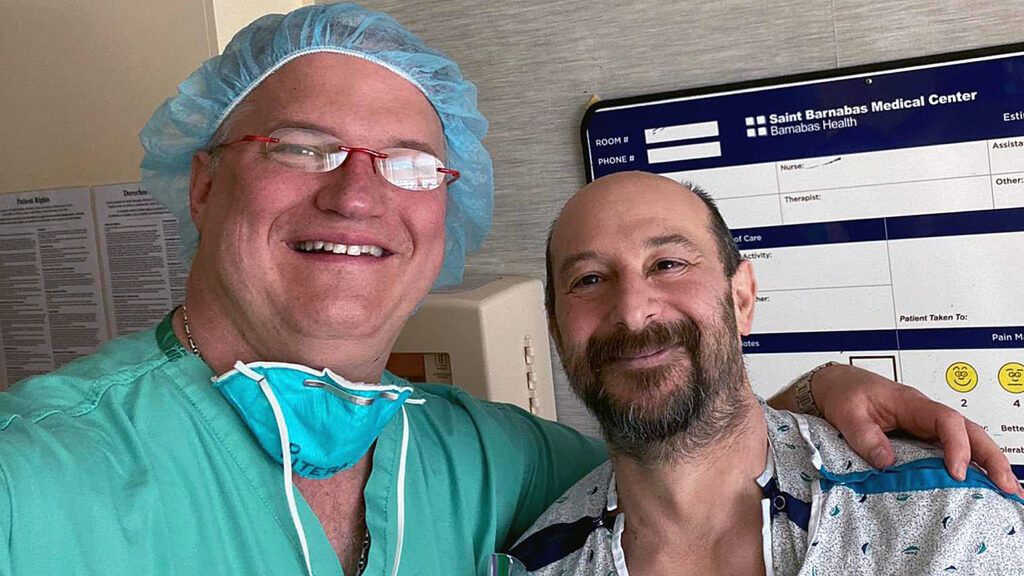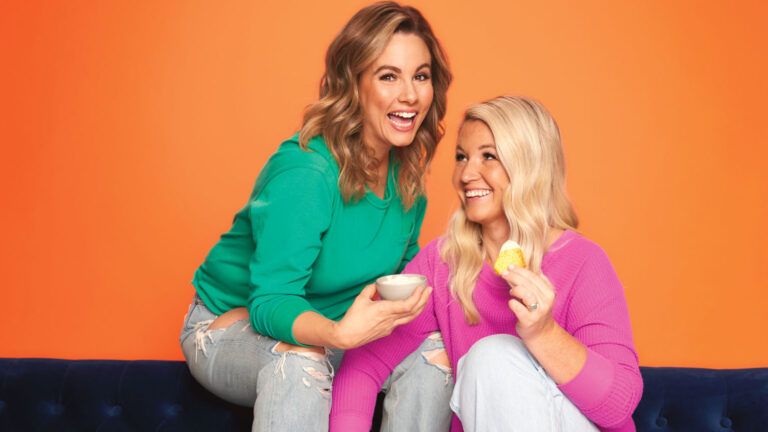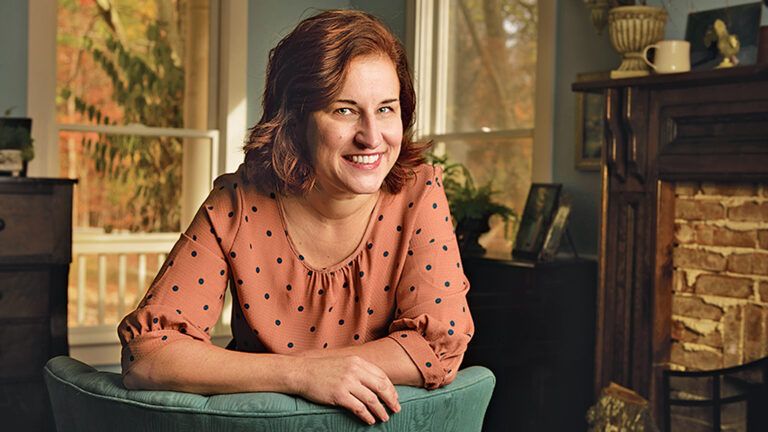RICK: St. Barnabas felt like a war zone, one of the busiest hospitals in New Jersey for Covid-19 admissions—close to being overwhelmed. I’m an anesthesiologist, a St. Barnabas lifer. The entire postanesthesia care unit had been converted to an ICU. I intubated patients, monitored how they were doing on ventilators. I tried to keep patients’ spirits up and reached out to their families.
I’m big on making that human connection, especially after my heart attack six years earlier. But patients were dying every day. We were short on masks, other PPE, ventilators. Hope seemed like one more essential running low.
DAN: I was in the bathroom at home when the walls started swimming. I grabbed for the sink just as my body sank to the floor. “Christine!” I yelled. In seconds, my wife was at my side. It was March 26. Six days earlier, we’d both tested positive for Covid-19. She’d gotten better. But I had a fever of 103.8. Sweating buckets.
“I’m calling 911,” Christine said. “We’re getting you to St. Barnabas.” I’d worked there forever, moving up from patient transport to cardiac exercise specialist. Christine’s a nurse. But we’d resisted going to the hospital. We knew how bad it was there.
RICK: I was doing rounds, checking patient charts. We’d had a couple new admissions. Radice, Dan, I read. In his early fifties, intubated, on a ventilator and an IV. Barely hanging on. I patted his leg and moved on.
I was nearly through all the patients, my mind on a million things, when it hit me. I knew that guy, only I’d always called him Danny. He’d saved my life. Now he was counting on me. I rushed back to his bed and bent down. “Hey, dude,” I said. “How are you doing?” He looked at me blankly. Oh man. He really wasn’t himself.
DAN: I knew a lot of the docs at St. Barnabas, but with the gear they were wearing now, all I could see were this guy’s glasses peeking over his mask. With the vent tube down my throat, I couldn’t even ask his name. I hated being so helpless. Not like in the cardiac rehab unit, where I was the one helping people get their lives back.
RICK: Walking into rehab the summer of 2014, I wasn’t sure what to expect. Three weeks earlier, a heart attack had landed me in the hospital where I work. The day before my 48th birthday, my chest started hurting something awful. I thought it was heartburn. Finally my wife said, “Either you stop complaining or I’m taking you to the ER.” She’s a nurse. I knew better than to argue.
Now I scanned the rehab workout area. A dozen people on the machines. No one huffing and puffing too bad. I could power through this, no problem. A trainer strode toward me. He stuck out his hand. I shook it. Let’s do this.
DAN: “Hi, I’m Danny,” I said. Right away I liked Rick’s spirit. But in almost 15 years as an exercise specialist, I’d seen my share of type A personalities. They want to crush the training in two weeks instead of 12. Thing is, exercising isn’t the hardest part. It’s making a total lifestyle change, eating differently, reducing stress. I showed Rick the machines.
“We start slow,” I said. “Three minutes walking on a treadmill. Then a three-minute walk down the hall. Alternate arm, leg and dual-action machines until you’ve gone through all the machines. We’ll do three sessions a week.” He walked the treadmill fine. Then he got on the elliptical and started stepping fast. “Hey, knucklehead,” I said. “We’re taking this slow, remember?”
RICK: I cocked my head. “Knucklehead?” Ha! We were going to get along great. Then and there, I vowed that I was going to absorb everything this dude could tell me. He knew what he was doing. It was my job to listen. Like my wife’s always telling me.
DAN: We chatted during our sessions, got to know each other. I was impressed by Rick’s focus. The next week, before we hit the machines, I said, “Let’s talk about the things that get you worked up. How are you feeling about life after your heart attack?”
RICK: I wanted to say I had everything under control, but I knew Danny would see through that. It felt like we’d known each other for years. We were both pushing 50, baseball fans, fathers of teenagers. We liked the same Mexican restaurants. We’d discovered our wives worked together in the burn unit back in the day. But we hadn’t talked about anything real deep until then.
“I’m a worrier,” I admitted. “I worry about everything. There’s a lot of pressure in my job. I want to spend more time with my wife, but I never manage to do it. I can’t sleep. So, yeah. This heart attack didn’t help. I never used to think about dying and now….”
DAN: Rick’s voice trailed off. I’d worked with dozens of patients. But there was something about this guy. I needed to reach him.
“Remember what I said about taking it slow?” I said. “That applies to everything. A lot of what we worry about is outside our control. Like dying. None of us know how long we’ve got. It’s about mindfulness, training yourself to live in the moment. There’s a lot of good information out there about it. You’ve got this, knucklehead. One step at a time.”
RICK: It wasn’t as if I’d never heard the stuff he was saying. But somehow, coming from Danny, it felt more real. I read up on mindfulness and tried the techniques in my daily life. I took time to really value my interactions with people. I found myself lingering longer with each patient, listening more.
After my own scare, I understood their fears better. I went on walks with my wife, my mind on her, on us and not on some work issue. The things that used to keep me up nights no longer seemed as critical. Exercising, eating healthier, being present—all of it worked together. I felt like a different person. At our last session, after 12 weeks, I hugged Danny hard. “Thanks, knucklehead,” I said. “I owe you, brother. Big-time.”
DAN: I could see the difference I’d made, and it felt great. Still, Rick deserved most of the credit. He’d done the work. After our sessions ended, we went our separate ways. We’d see each other in the halls or the cafeteria at St. Barnabas and stop to catch up. I didn’t expect anything more. It’s not as if I thought we were going to be best buds.
RICK: It was Danny’s second day in the ICU. I’d arranged for Christine to FaceTime with him. Isolation from families is one of the toughest things for Covid-19 patients. I sat at the edge of Danny’s bed and held my phone so he could see the screen. “We’ve got someone who wants to say hi to you,” I said. Our gazes met and held. Like two old friends. He recognized me!
Christine’s face appeared on my phone. “Hi, sweetheart,” she said to Danny. “It’s so great to see you. Just keep swimming, okay? Don’t give up!” Was that a line from Finding Nemo? Danny rolled his eyes. I had to laugh. Now this was the dude I knew.
DAN: By that evening, any good feeling I had from the call with my wife was gone. I was so weak. Even with the ventilator, it felt as if every breath could be my last. Like I was drowning. I wanted to pray, but my mind couldn’t find the words. It was terrifying. Rick came to check on me. I mustered all my strength and motioned to write a note. There was something I needed to know. And if anyone would give it to me straight, it was Rick.
RICK: I got Danny a pen and a pad of paper. I watched as he shakily wrote a question. “Am I going to die tonight?” What a gut punch. I struggled to find the right words. It felt as if his very survival depended on it. “No, not if I can help it,” I choked out. I took his hand and looked him right in the eye. “You are not going to die on my watch.” Danny laid his head back and closed his eyes.
He made it through the night, but after that, he was pretty out of it. Every time there was an emergency in that ICU, a patient coding, I’d run in, wondering, Is it Danny?
DAN: Where was I? Slowly things came into focus. Oh yeah, St. Barnabas. I sensed that time had passed, how long I had no idea. But I was alive. And there was Rick across the room. He must have felt me looking at him. He turned, and I could see his eyes light up.
RICK: I yelled, like we were two soldiers who’d made it through a firefight. “Hey, knucklehead! You’re still here?”
DAN: Something in Rick’s voice—the jubilation, the sense that we were truly in this together—struck me. At that moment I knew: Weak as I felt right now, I was going to be okay.
Within days, I’d improved enough to be moved to the Covid-19 recovery floor. I figured out an exercise routine I could do in bed, working my quads and glutes. I couldn’t believe how hard it was to do a leg extension. After a week, I graduated to squats beside my bed.
I decided to walk to the sink 10 feet away. But I wasn’t ready. My legs shaking, I managed to get back in bed. I had to push myself harder. I wanted to get home to Christine and the kids.
RICK: Every chance I got, I went to visit Danny. I wanted to keep his spirits up, but I’d also heard about his aggressive exercise regimen. “You need to take it easy,” I told him. “Go slow. Isn’t that what you were always telling me?”
It turns out, we all need to be reminded to live in the moment. The whole hospital was cheering him on. After so much death and sadness, Danny’s survival was a beacon of hope. Better days lay ahead. As a wise person once told me: One step at a time.
DAN: Twenty-three days after I’d been admitted, I got word that I was being discharged. I texted Rick, and he came up to my room. “You saved my life,” I said. “I can’t tell you how thankful I am.”
Rick pulled down his mask, wrapped an arm around me and snapped a selfie to commemorate the moment. “You saved my life,” he said. “But we can stop now. Really, we’re good.”
I laughed. God put this knucklehead in my life, no doubt about it. What a powerful reminder that, no matter the challenges ahead for our world, we’ll be there for each other.
For more inspiring stories, subscribe to Guideposts magazine.




